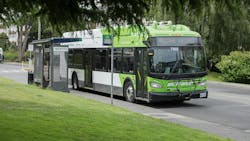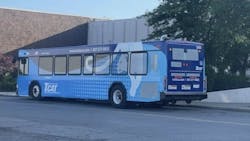New buses are rolling out in BC Transit’s Victoria Regional Transit System and in Tompkins Consolidated Area Transit’s (TCAT) system. Victoria Regional Transit System is putting new electric buses into service over the next few weeks while TCAT is introducing its first delivery of new Gillig diesel buses.
BC Transit’s new battery-electric buses coming to Victoria Regional Transit System
Victoria Regional Transit System is getting new electric buses. BC Transit’s first 10 heavy-duty electric buses began arriving in April 2025 and are expected to gradually enter service in the coming weeks. All 10 vehicles are anticipated to be on the road by fall 2025.
The 10 electric buses are expected to reduce carbon emissions by nearly 95 percent, or the equivalent of 12,000 tons of CO2 over their lifetime. Each electric bus will save about one tanker truck of diesel fuel per year, or about 550 fill-ups for a mid-size car. In total, BC Transit says it has 125 heavy-duty electric buses on order with Nova Bus and New Flyer. The organization plans to have close to 80 electric buses serving other regional transit systems by the end of 2026.
“We are thrilled to see the first electric buses on the road in the Greater Victoria area,” said BC Transit President and CEO Erinn Pinkerton. “Electric buses are an important component of BC Transit’s overall plan to reduce greenhouse gas emissions and build a more sustainable future. This is a massive milestone for BC Transit. We are entering an exciting new era, and I want to thank our funding partners for making this achievement possible.”
Funding for BC Transit’s first 10 electric buses was announced in July 2019. The project was made possible thanks to joint funding of C$28.6 million (US$20.9 million) delivered through the Public Transit Infrastructure Stream of the Investing in Canada Infrastructure Program, with contributions from the government of Canada, the province of British Columbia and the Victoria Regional Transit Commission. Additional funding of C$395.5 million (US$289.6 million) for BC Transit electric buses and infrastructure was announced in July 2023, supported in part by the Zero-Emission Transit Fund and the Investing in Canada Infrastructure Program.
“These new electric buses are a big win for people in Greater Victoria—quieter rides, cleaner air and a more comfortable community,” said Parliamentary Secretary for Transit for British Columbia George Anderson. “These electric buses are a sign of what’s ahead: a sustainable, accessible and future ready transit system for all of B.C. Victoria is showing what leadership on climate and transit looks like.”
BC Transit says it is proud to work to CleanBC climate action goals with support from the province of British Columbia and government of Canada funding programs.
“Electric buses are a smart investment for the future of the region. They align with Victoria’s climate goals by reducing emissions and improving air quality for everyone in our community,” said city of Victoria Mayor Marianne Alto, who also serves as vice chair of the Victoria Transit Commission and a board member of BC Transit. “This is a meaningful step toward building a more sustainable, accessible and resilient transportation network.”
TCAT’s first three of five new Gillig buses enter service
TCAT is addressing its ongoing challenge with bus shortages with the launch of the first three of five new Gillig diesel buses. Three of the 40-foot buses, which feature a new blue design with a prominent white cat, went into service June 24. TCAT says the other two will be placed into service in the coming weeks.
“These new buses are the first step in an extensive renewal of the TCAT fleet, which will leave riders with a cleaner, more comfortable and more reliable commute,” said TCAT General Manager Matthew Rosenbloom-Jones.
TCAT notes started the procurement process in April of 2024 to acquire the new buses, which Gillig produced at its California manufacturing plant in less than 18 months.
The buses cost about $520,000 each and were funded by New York’s Modernization Enhancement and Accelerated Transit Capital programs. TCAT artist Jenn Jennings created the new paint scheme and design with a larger version of TCAT’s signature cat. Jenning’s design is an update from the 20-year-old design that used a mostly white-and blue palette topped off with red and yellow ribbons.
Rosenbloom-Jones says the new buses are providing relief from bus shortages, exacerbated by an aging fleet and the mothballing of TCAT’s seven 2021 Proterra battery-electric buses. The agency adds the seven Proterra buses were decommissioned in the spring of 2024 after mechanics discovered design flaws, rendering the buses unsafe.
“Throughout the remainder of the summer, TCAT riders can expect to see additional new buses enter service while older vehicles beyond their service life, many of which are obsolete, will gradually be removed,” Rosenbloom-Jones said. “TCAT would also like to recognize Gillig who made these new buses possible with an accelerated production timeline that helped us as we struggled due to the premature withdrawal of our Proterra buses due to safety reasons.”
TCAT says it hasn’t abandoned its aim to transition its fleet to zero- and low-emission buses and expects to add six Gillig 40-foot next-generation battery-electric buses early next year. The electric buses will retain a similar paint scheme with an electric theme that Jennings created in 2021. TCAT is also in the process of procuring two new 40-foot hybrid buses that will be arriving in the spring of 2026.
About the Author
Megan Perrero
Editor in Chief
Megan Perrero is a national award-winning B2B journalist and lover of all things transit. Currently, she is the Editor in Chief of Mass Transit magazine, where she develops and leads a multi-channel editorial strategy while reporting on the North American public transit industry.
Prior to her position with Mass Transit, Perrero was the senior communications and external relations specialist for the Shared-Use Mobility Center, where she was responsible for helping develop internal/external communications, plan the National Shared Mobility Summit and manage brand strategy and marketing campaigns.
Perrero serves as the board secretary for Latinos In Transit and is a member of the American Public Transportation Association Marketing and Communications Committee. She holds a bachelor’s degree in multimedia journalism with a concentration in magazine writing and a minor in public relations from Columbia College Chicago.


